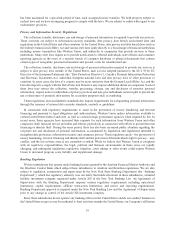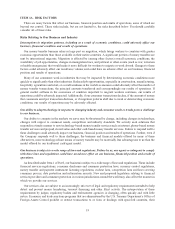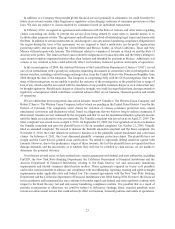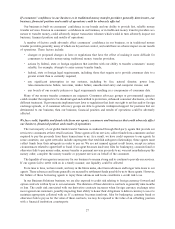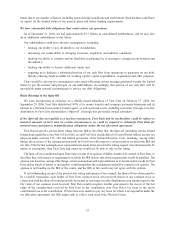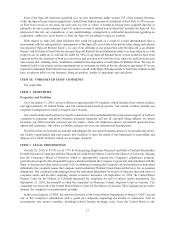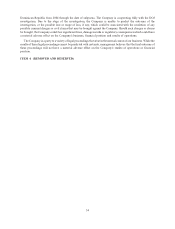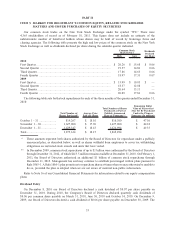Western Union 2010 Annual Report Download - page 27
Download and view the complete annual report
Please find page 27 of the 2010 Western Union annual report below. You can navigate through the pages in the report by either clicking on the pages listed below, or by using the keyword search tool below to find specific information within the annual report.In addition, as a Company that provides global financial services primarily to consumers, we could be subject to
future class-action lawsuits, other litigation or regulatory action alleging violations of consumer protection or other
laws. We also are subject to claims asserted by consumers based on individual transactions.
In February 2010, we signed an agreement and settlement with the State of Arizona and other states regarding
claims concerning our ability to prevent our service from being abused by some users to launder money or to
facilitate other criminal activity. The agreement and settlement resolved all outstanding legal issues and claims with
the State. In addition to certain investments in, and changes to, our anti-money laundering compliance obligations in
the region during the term of the agreement, we are required to fund a multi-state not-for-profit organization
promoting safety and security along the United States and Mexico border, in which California, Texas and New
Mexico will participate with Arizona. The settlement relates to a number of lawsuits in which we and the State of
Arizona were parties. The issues in those cases related to subpoenas for transaction data and the State’s attempt to
seize money transfers originated in states other than Arizona and intended for payment in Mexico. Additional civil
actions or any criminal actions could adversely affect our business, financial position and results of operations.
In the second quarter of 2009, the Antitrust Division of the United States Department of Justice (“DOJ”) served
one of our subsidiaries with a grand jury subpoena requesting documents in connection with an investigation into
money transfers, including related foreign exchange rates, from the United States to the Dominican Republic from
2004 through the date of the subpoena. The Company is cooperating fully with the DOJ investigation. Due to the
stage of the investigation, we are unable to predict the outcome of the investigation, or the possible loss or range of
loss, if any, which could be associated with the resolution of any possible criminal charges or civil claims that may
be brought against us. Should such charges or claims be brought, we could face significant fines, damage awards or
regulatory consequences which could have a material adverse effect on our business, financial position and results
of operations.
We are a defendant in two purported class action lawsuits: James P. Tennille v. The Western Union Company, and
Robert P. Smet v. The Western Union Company, both of which are pending in the United States District Court for the
District of Colorado. The complaints assert claims for violation of various consumer protection laws, unjust
enrichment, conversion and declaratory relief, based on allegations that we wait too long to inform consumers if
their money transfers are not redeemed by the recipients and that we use the unredeemed funds to generate income
until the funds are escheated to state governments. The Tennille complaint was served on us on April 27, 2009. The
Smet complaint was served on us on April 6, 2010. On September 21, 2009, the Court granted our motion to dismiss
the Tennille complaint and gave the plaintiff leave to file an amended complaint. On October 21, 2009, Tennille
filed an amended complaint. We moved to dismiss the Tennille amended complaint and the Smet complaint. On
November 8, 2010, the Court denied our motion to dismiss as to the plaintiffs’ unjust enrichment and conversion
claims. On February 4, 2011, the Court dismissed plaintiffs’ consumer protection claims. The plaintiffs have not
sought and the Court has not granted class certification. We intend to vigorously defend ourselves against both
lawsuits. However, due to the preliminary stages of these lawsuits, the fact the plaintiffs have not quantified their
damage demands, and the uncertainty as to whether they will ever be certified as class actions, we are unable to
determine the potential outcome.
Over the past several years, we have entered into consent agreements with federal and state authorities, including
FinCEN, the New York State Banking Department, the California Department of Financial Institutions and the
Arizona Department of Financial Institutions, relating to the Bank Secrecy Act and anti-money laundering
requirements and related consumer identification matters. These agreements required us to pay civil penalties
and to take certain measures to enhance our compliance with recordkeeping, reporting, training and agent oversight
requirements under applicable state and federal law. The consent agreements with the New York State Banking
Department and the California Department of Financial Institutions were lifted during 2008. However, the financial
services industry and businesses like ours continue to be under significant federal and state regulatory scrutiny with
respect to the Bank Secrecy Act and anti-money laundering compliance matters. It is possible that as a result of
periodic examinations or otherwise, we could be subject to deficiency findings, fines, criminal penalties, asset
seizures or enforcement actions that could adversely affect our business, financial position and results of operations.
25



